Introduction
In the ever-evolving world of technology, Generative AI has emerged as a game-changer, bringing innovation and efficiency to industries across the board.
From healthcare to entertainment, marketing to manufacturing, this cutting-edge technology is not just a buzzword—it's reshaping the way businesses operate, enhancing customer experiences, and driving productivity like never before.
Imagine a world where machines don’t just follow commands, but create new ideas, solve problems, and predict trends. That’s the power of Generative AI.
In fact, a recent report by McKinsey revealed that AI adoption could add $13 trillion to the global economy by 2030, with Generative AI examples being one of the primary drivers of this growth.
Whether it's helping doctors personalize treatments, enabling marketers to create hyper-targeted ads, or empowering artists to craft unique works of art, the applications of Generative AI are endless.
In this blog, we’ll take a deep dive into how Generative AI examples are transforming key industries and uncover how businesses are leveraging this technology to stay ahead in today’s competitive landscape. Ready to explore the future? Let’s dive in!
What is Generative AI?
Generative AI refers to a class of artificial intelligence models designed to generate new, synthetic content—such as images, text, music, and more—by learning patterns from existing data.

Unlike traditional AI systems that rely on pre-programmed rules and logic, generative AI models learn directly from large datasets to produce outputs that mimic human creativity and intelligence.
At the heart of generative AI are advanced machine learning techniques like Generative Adversarial Networks (GANs), Variational Autoencoders (VAEs), and language models such as GPT (Generative Pre-trained Transformers).
These models have the ability to understand complex data relationships and can generate realistic, often indistinguishable, new data based on the input they receive.
The power of generative AI lies in its ability to create content that can be applied across various industries, offering businesses unprecedented opportunities for innovation and efficiency.
Its application is transforming everything from customer service and marketing to healthcare and entertainment, allowing businesses to tap into new levels of creativity, personalization, and productivity.
Benefits of Harnessing Generative AI
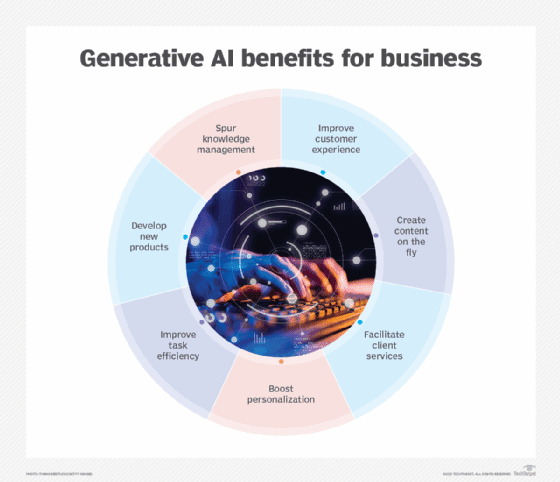
Following are some benefits of harnessing Generative AI:
Enhanced Personalization
Generative AI applications are instrumental in personalizing user experiences. By analyzing customer data, generative AI models can generate customized recommendations, content, and services tailored to individual preferences.
For example, platforms like Netflix and Spotify use generative AI models to suggest movies, shows, or music based on a user’s past behavior and preferences, creating a more engaging experience.
Cost Efficiency and Automation
Generative AI can drastically reduce operational costs by automating content creation, customer support, and even product design.
OpenAI's GPT models, for example, have been successfully integrated into chatbot solutions to handle customer queries, saving businesses time and money that would otherwise be spent on human labor. Furthermore, it allows for round-the-clock service, delivering immediate responses without human intervention.
Boosting Creativity and Innovation
Generative AI has proven itself to be a valuable tool in industries that require creative content generation. In marketing and advertising, generative AI can create personalized copy, videos, and images, enabling brands to scale their content creation efforts.
Similarly, in the fashion and design industries, it allows for the generation of new product concepts, saving time and reducing the risk of creative fatigue.
Data Augmentation and Synthesis
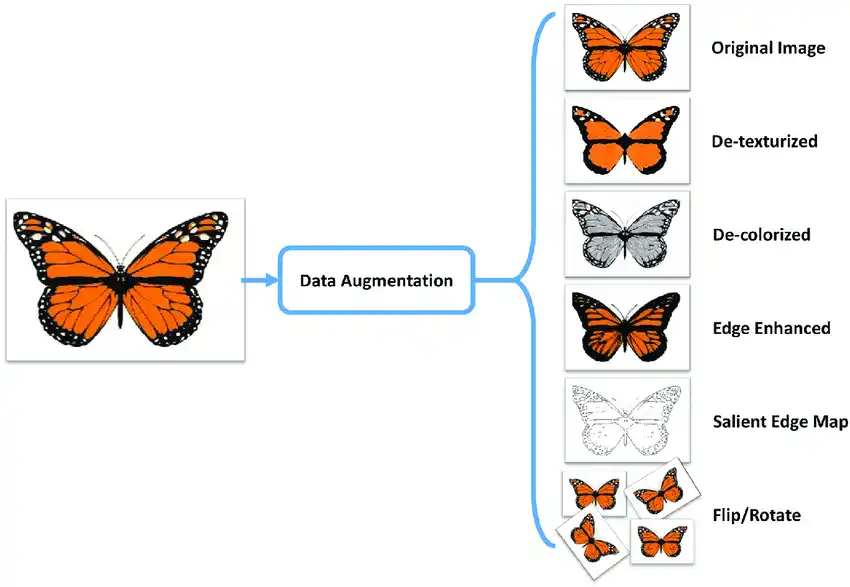
Generative AI models are especially useful in industries that suffer from sparse or incomplete data.
By synthesizing new data based on the available information, they can help fill in gaps, improve decision-making, and even train other AI systems.
In healthcare, for instance, generative AI models can create synthetic medical data to simulate rare diseases, assisting in research without the ethical concerns of using real patient data.
Realistic Simulations for Training and Development
In fields like healthcare and engineering, generative AI is being harnessed to create simulations that allow for better training and development.
For example, in medicine, generative AI can generate realistic medical scenarios to train doctors, helping them practice complex procedures in a risk-free environment.
Similarly, in manufacturing, AI-generated simulations are used to test product designs under various conditions, optimizing the development process before physical prototypes are built.
Scalability and Flexibility
One of the most powerful aspects of generative AI is its ability to scale effortlessly.
Whether it’s creating millions of personalized marketing emails, generating product recommendations for an entire e-commerce platform, or designing thousands of different variations of a single ad campaign, generative AI can handle vast amounts of data and produce results quickly and efficiently.
Why It’s Important to Harness the Power of Generative AI
Generative AI has the potential to drive exponential growth and innovation, giving businesses the tools they need to thrive in a fast-paced, ever-evolving digital world.
As industries across the globe continue to embrace these generative AI models, they can unlock new opportunities for efficiency, creativity, and personalization.
Whether it's crafting unique customer experiences, improving internal processes, or discovering new ways to engage consumers, harnessing the power of generative AI is becoming increasingly essential to staying competitive in today’s data-driven economy.
From customer service automation to dynamic content generation, the applications of generative AI are endless. As AI technology advances, those who can effectively integrate these tools into their operations will be better equipped to meet evolving consumer demands and lead the way in their respective industries.
Key Generative AI Applications in Healthcare

Generative AI is reshaping healthcare, offering innovative solutions that significantly enhance patient outcomes, streamline operations, and accelerate research processes.
From drug discovery to medical diagnostics, generative AI is driving the next wave of advancements in the industry.
Drug Discovery and Development
Generative AI is accelerating drug discovery and development by dramatically reducing time and costs.
These models analyze large datasets, identify potential drug compounds, and predict interactions, making the process faster and more efficient.
Identifying New Compounds:
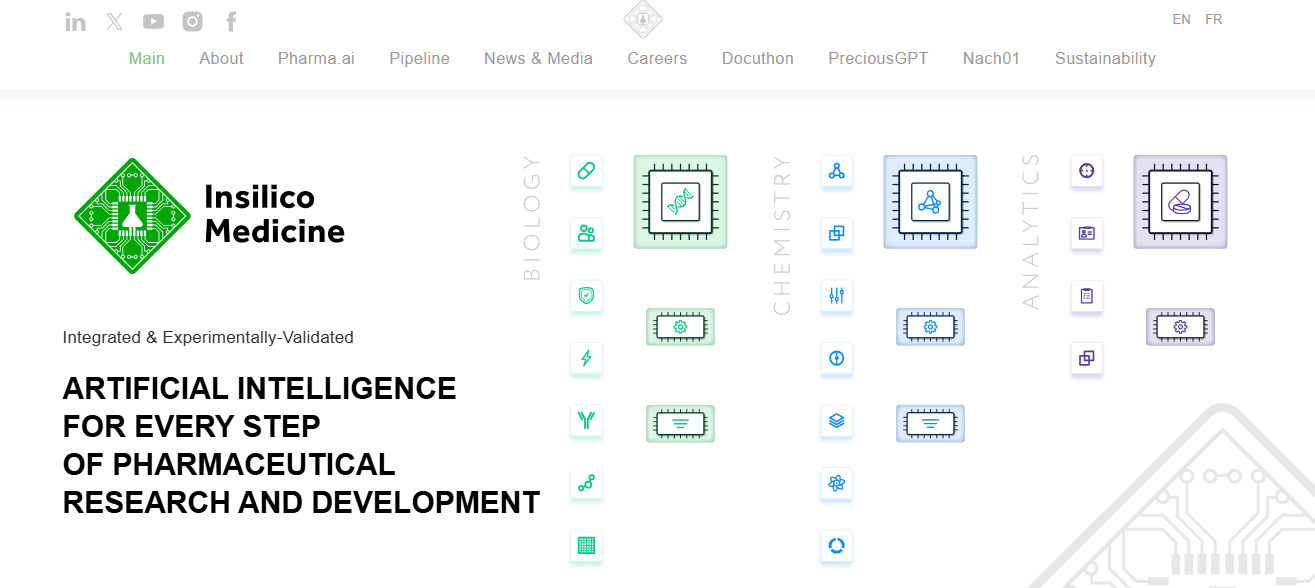
Generative AI models can rapidly analyze vast biological data to discover new compounds.
For instance, Insilico Medicine, a leader in AI-driven drug discovery, used generative AI to design a promising new drug for fibrosis in just 46 days, a process that typically takes years using traditional methods.
Predicting Drug Interactions:
Generative AI helps predict how new drugs will interact with existing medications, reducing the risk of harmful side effects.
BenevolentAI uses AI to analyze drug interaction data, enabling safer and more targeted treatments for patients. By predicting interactions in real-time, researchers can optimize drug efficacy and safety.
Optimizing Drug Formulations:
Generative AI plays a crucial role in optimizing drug formulations, ensuring better patient outcomes.
Atomwise, an AI-driven biotech company, utilizes deep learning to develop drugs with higher efficacy and fewer side effects. Their use of AI models for drug design has led to improved treatments for various diseases, including cancer.
Personalized Medicine
Generative AI is revolutionizing personalized medicine by creating customized treatment plans based on patient data, ensuring higher success rates and improved patient satisfaction.
Customized Treatment Plans:
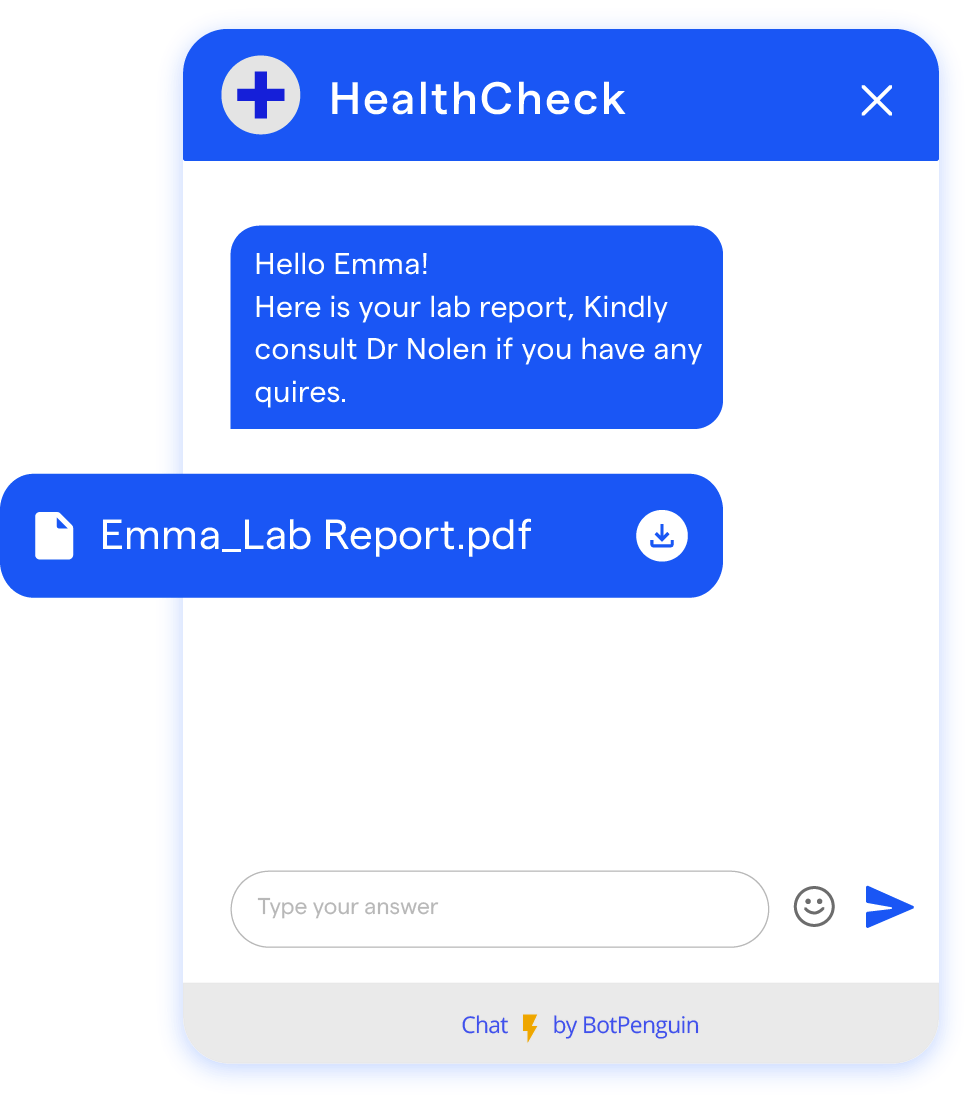
By analyzing genetic, lifestyle, and environmental data, generative AI models can design highly personalized treatment plans.
Tempus, a leader in precision medicine, uses AI to analyze molecular data to develop individualized cancer treatments. Their platform has helped oncologists provide personalized therapies, enhancing treatment outcomes.
Moreover smart AI powered chatbots like Botpenguin can act as personal reminders to take medicine and check health metrics.
Predicting Treatment Responses:
AI’s predictive power helps determine how individual patients will respond to specific treatments.
Mount Sinai Health System has employed AI models to predict chemotherapy responses, improving the precision of cancer treatments and minimizing unnecessary side effects.
Developing Targeted Therapies:
Generative AI models allow for the creation of treatments that target specific genetic profiles.
Zymergen, a synthetic biology company, uses AI to develop novel biologic therapies for rare diseases by identifying specific genetic markers, leading to more effective and personalized treatment options.
Medical Imaging and Diagnostics
Generative AI is improving medical imaging and diagnostics by providing faster, more accurate results, which help healthcare professionals make more informed decisions.
- Early Disease Detection: AI models enhance early detection by analyzing medical images for subtle signs of disease.
For example, Google Health has developed an AI model that can detect early signs of breast cancer in mammograms, significantly reducing the rate of false negatives and improving early intervention.
- Improving Diagnostic Accuracy: Generative AI improves diagnostic accuracy by reducing human error. Radiologists at Stanford Medicine use AI-enhanced imaging to accurately detect lung nodules in CT scans, providing faster and more reliable diagnoses.
- Automating Image Analysis: AI can automate the analysis of complex medical images, saving time for healthcare providers.
Aidoc, a medical imaging AI company, developed a solution that helps radiologists detect brain hemorrhages from CT scans in real time, ensuring timely and accurate diagnoses.
Key Generative AI Applications in Finance
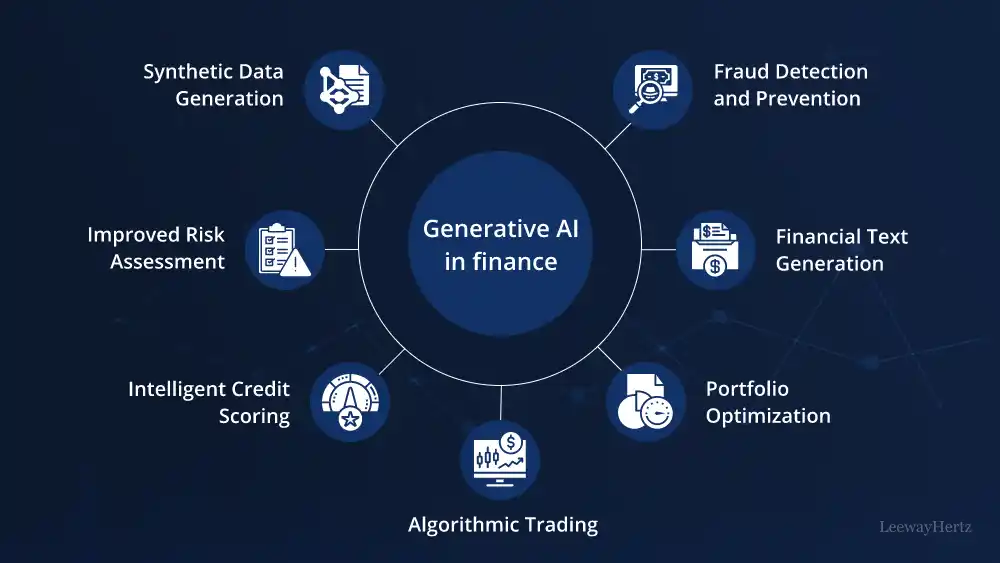
Generative AI is transforming the finance sector, enhancing security, optimizing trading strategies, and managing risks more effectively.
The use of generative AI in financial applications is improving operational efficiency and providing better services for customers.
Fraud Detection and Prevention
Generative AI is crucial in preventing and detecting fraud by analyzing vast amounts of transaction data in real time.
- Real-time Monitoring: AI continuously monitors transactions to identify suspicious patterns indicative of fraud.
For instance, HSBC uses AI systems to flag unusual banking transactions, helping to prevent financial fraud and mitigate losses.
- Behavioral Analysis: Generative AI models can analyze user behavior to detect fraudulent activities. American Express employs AI to monitor spending patterns and alert customers about potential fraud, ensuring a more secure payment system.
- Adaptive Learning: Generative AI models continuously learn from new fraud cases to adapt their detection capabilities.
Mastercard uses AI algorithms that improve over time, allowing for better detection of emerging fraud tactics.
Suggested Reading:
7 Innovative Ways Generative AI Apps Boost Business Productivity
Algorithmic Trading
Generative AI is revolutionizing trading by providing insights that help optimize trading decisions and automate processes.
- Predictive Analytics: Generative AI models can analyze historical market data to predict trends and inform trading decisions.
Two Sigma, a quantitative hedge fund, uses AI to predict stock movements, enabling them to make more profitable trading decisions.
- Automated Trading: AI can execute trades at optimal times by analyzing real-time market data. Renaissance Technologies, a leading hedge fund, uses AI-driven algorithms for high-frequency trading, capitalizing on micro-price fluctuations to generate profits.
- Risk Management: AI models can assess and manage trading risks by analyzing various market conditions. For example, Goldman Sachs uses AI to balance portfolios and mitigate exposure to volatile markets, providing safer, more effective trading strategies.
Risk Management
Generative AI is also playing a crucial role in assessing and managing financial risks, helping institutions make better decisions and avoid losses.
- Credit Risk Analysis: Generative AI models assess the creditworthiness of loan applicants by analyzing a wide range of factors. LenddoEFL uses AI to assess the credit risk of individuals without traditional credit histories, expanding access to financial services.
- Market Risk Assessment: AI models predict market risks and suggest strategies to mitigate them. Barclays employs AI to analyze market trends and adjust investment strategies, reducing the risk of significant financial losses during market downturns.
- Operational Risk Management: Generative AI helps identify operational risks within organizations, such as internal process inefficiencies or regulatory compliance issues.
JPMorgan Chase uses AI-driven systems to monitor internal operations, preventing potential issues before they escalate and ensuring smoother business functions.
Key Generative AI Applications in Entertainment
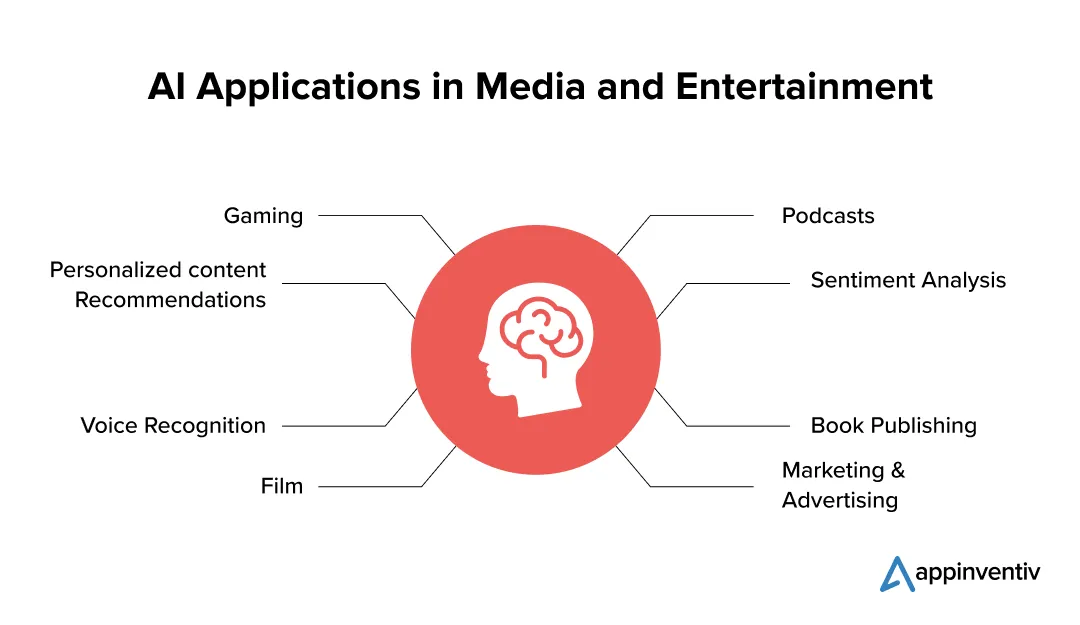
Generative AI is driving a wave of innovation in the entertainment sector, enhancing everything from content creation to immersive virtual experiences.
These technologies are reshaping how entertainment is produced, consumed, and experienced, opening up new possibilities for creators and audiences alike.
Content Creation (Music, Art, Writing)
Generative AI has become an invaluable tool in the creative industries, automating processes and expanding the boundaries of artistic expression.
- Music Composition: Generative AI is revolutionizing music production by creating original compositions in specific genres or moods.
For instance, a popular music streaming service, like Spotify, leverages AI algorithms to generate personalized playlists tailored to users' tastes and listening habits, elevating user experience.
- Visual Arts: AI-generated artworks are pushing the boundaries of creativity in the visual arts. One art gallery showcased a series of AI-created paintings, capturing the attention of both digital art enthusiasts and traditional art collectors, blending technology and art in innovative ways.
- Writing Assistance: Writers are utilizing AI to expedite content creation. For example, a publishing house collaborated with AI to generate detailed book outlines, draft character development arcs, and even suggest plot ideas, enabling writers to focus more on refining narratives while speeding up the creative process.
Game Design and Development
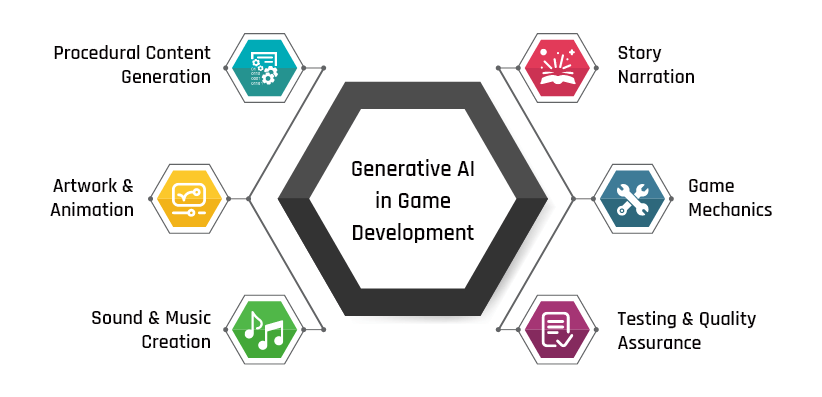
Generative AI is transforming the world of gaming by streamlining the design process and enhancing the gaming experience.
- Level Design: AI is being used to create intricate and diverse game environments. A game development studio used AI to generate random yet structured game levels that ensure each gameplay experience is unique. This resulted in higher player engagement and retention.
- Character Creation: AI-driven models are being used to design realistic, diverse game characters. For instance, developers employed AI in a role-playing game (RPG) to generate character animations that adapt to different storylines, creating a more immersive and interactive player experience.
- Storytelling: In gaming, narrative development is crucial, and AI is helping storytellers craft compelling storylines. A well-known game designer used AI to create evolving plots that respond to player decisions, offering personalized story arcs and heightening emotional engagement.
Virtual Reality and Simulations
Generative AI is playing a major role in shaping the future of virtual reality (VR) and simulations, enhancing training, entertainment, and educational experiences.
- Environment Creation: AI is used to generate realistic VR environments that mimic real-world locations.
For example, a VR company developed lifelike simulations of ancient civilizations for educational purposes, allowing students to immerse themselves in historical settings.
- Interactive Experiences: AI is powering interactive elements in VR, creating dynamic and personalized experiences.
A major theme park incorporated AI-driven VR attractions that respond to user interactions, providing each visitor with a unique experience and deepening engagement.
- Simulation Training: Medical institutions are utilizing AI to design VR simulations for hands-on surgical training.
For instance, medical schools have employed AI-powered VR systems that allow students to practice complex surgeries in a risk-free environment, reducing the likelihood of real-world errors.
Key Generative AI Applications in Manufacturing
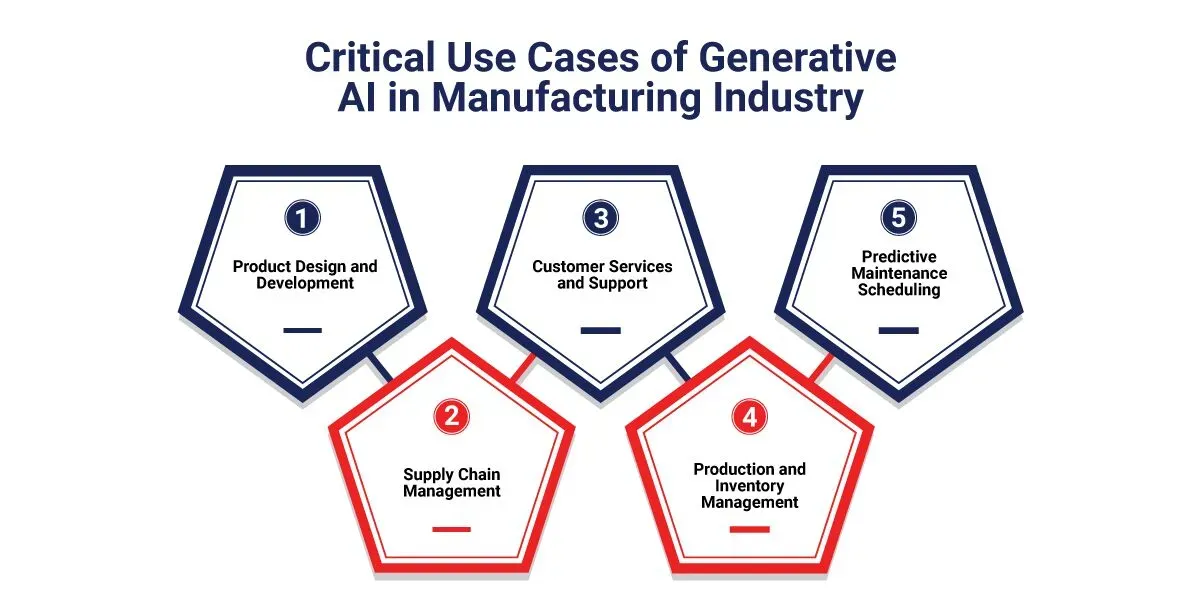
Generative AI is playing a transformative role in manufacturing by optimizing design, enhancing predictive maintenance, and streamlining supply chain operations.
These innovations are leading to more efficient production cycles, reduced operational costs, and higher product quality.
Product Design and Prototyping
Generative AI is revolutionizing product design, enabling faster prototyping and more innovative, customized designs.
- Design Optimization: AI algorithms suggest improvements to product designs based on functionality, aesthetic value, and performance.
For instance, a leading automotive company implemented AI to refine its vehicle designs, improving aerodynamics and fuel efficiency, all while reducing production costs.
- Rapid Prototyping: AI accelerates the prototyping phase by automatically generating and testing multiple design iterations.
A tech startup employed AI to rapidly prototype a new consumer electronics product, cutting development time by weeks and accelerating time to market.
- Customization: AI-driven design tools enable the creation of personalized products. A high-end furniture manufacturer used AI to offer custom furniture designs, enabling customers to choose materials, sizes, and colors, which resulted in increased sales and customer satisfaction.
Predictive Maintenance
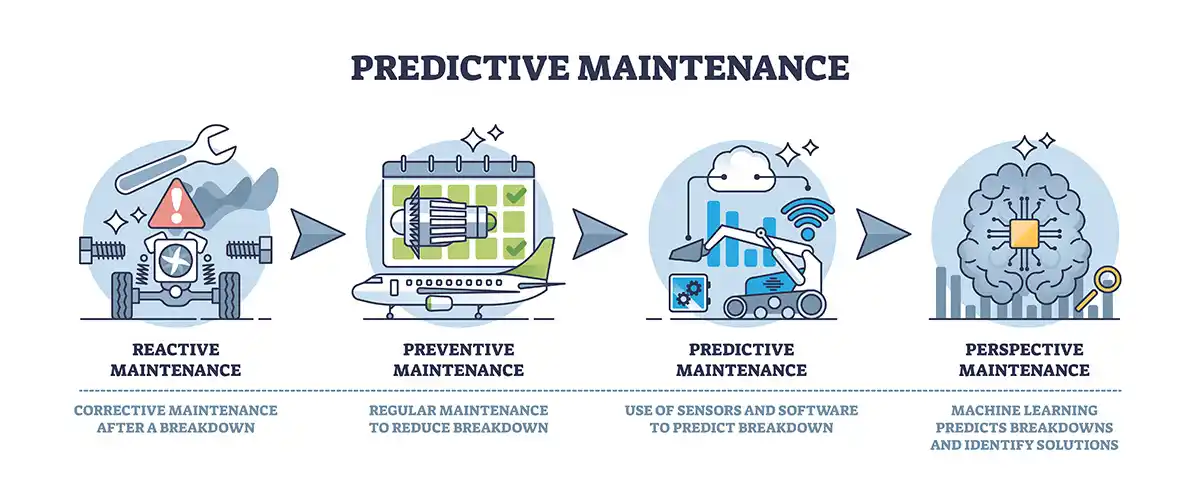
Generative AI is increasingly being used in manufacturing to predict equipment failures before they occur, reducing downtime and improving operational efficiency.
- Fault Detection: AI models monitor machinery in real-time to detect potential issues before they become critical.
A large-scale factory implemented AI-based monitoring systems, identifying faults in key equipment and preventing unplanned downtimes that could have led to significant production losses.
- Maintenance Scheduling: AI optimizes maintenance schedules by analyzing usage patterns and predicting when equipment is most likely to fail.
An industrial plant employed AI to schedule routine maintenance during off-peak hours, minimizing disruptions and ensuring that production lines remain operational.
- Cost Reduction: AI helps manufacturers predict future maintenance needs, allowing them to manage repair budgets more efficiently.
A leading manufacturing company leveraged AI to forecast wear and tear on machinery, leading to a reduction in unnecessary part replacements and service calls.
Supply Chain Optimization
Generative AI is helping businesses optimize their supply chain, from predicting demand to improving logistics and supplier relationships.
- Demand Forecasting: AI models predict product demand with a high degree of accuracy, helping companies manage inventory levels more efficiently.
A global retailer used AI to analyze historical sales data and market trends, allowing it to forecast demand for seasonal products and avoid overstocking or stockouts.
- Logistics Management: AI is optimizing logistics operations, reducing costs, and improving delivery speeds. A logistics company employed AI to optimize its delivery routes, leading to lower transportation costs, shorter delivery times, and a significant boost in customer satisfaction.
- Supplier Management: AI tools assess supplier reliability and performance, helping businesses identify the best partners for long-term success.
A manufacturing company used AI to evaluate suppliers based on quality, delivery times, and pricing, ensuring they maintained a steady supply of high-quality materials.
Key Generative AI Applications in Marketing and Advertising
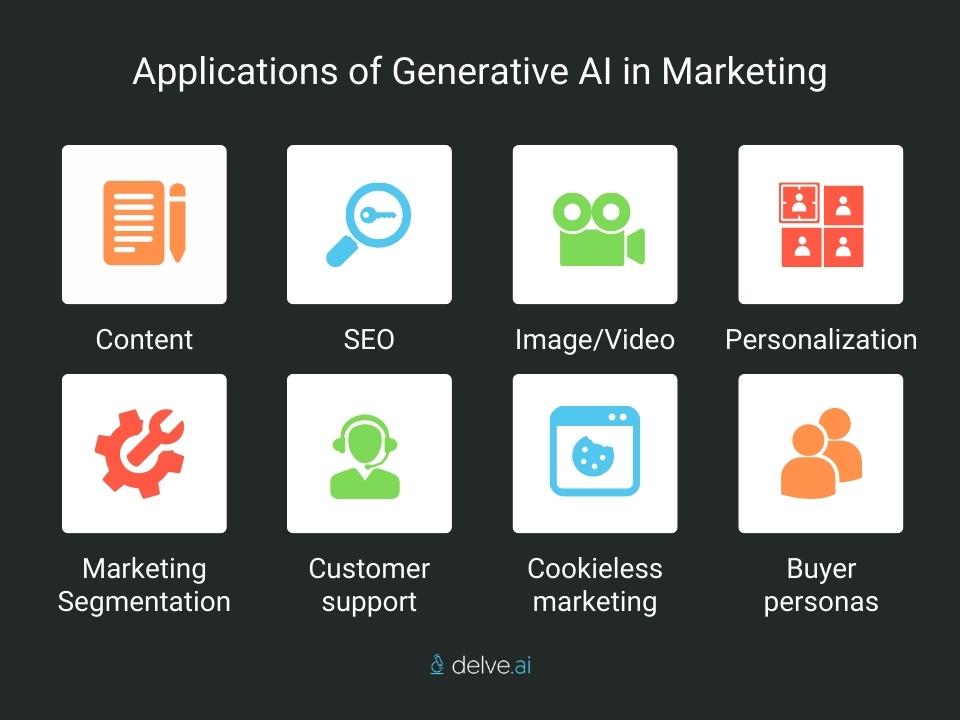
Generative AI is transforming the marketing and advertising landscape by offering innovative solutions that enhance personalization, provide actionable customer insights, and generate compelling content.
These advancements are making marketing strategies more efficient, effective, and data-driven.
Personalized Marketing Campaigns
Generative AI empowers businesses to create highly personalized marketing campaigns that engage individual customers, improving the overall customer experience.
Targeted Advertising:
AI analyzes vast amounts of data to understand customer preferences and behaviors, enabling businesses to create highly targeted ads.
For example, a retail company used AI to deliver personalized ads to customers based on their browsing history, significantly boosting click-through rates and sales.
Generative AI examples tools like Botpenguin can assist in your lead generation and marketing automation tasks to streamline processes.
Suggested Reading:
How Generative AI Models Help in Enhancing Chatbot Conversations
Dynamic Content Creation:
AI tools generate personalized content for emails, social media posts, and website banners.
An e-commerce platform leveraged AI to create custom email campaigns that resonated with different customer segments, leading to higher open rates, click-through rates, and overall engagement.
Real-time Personalization:
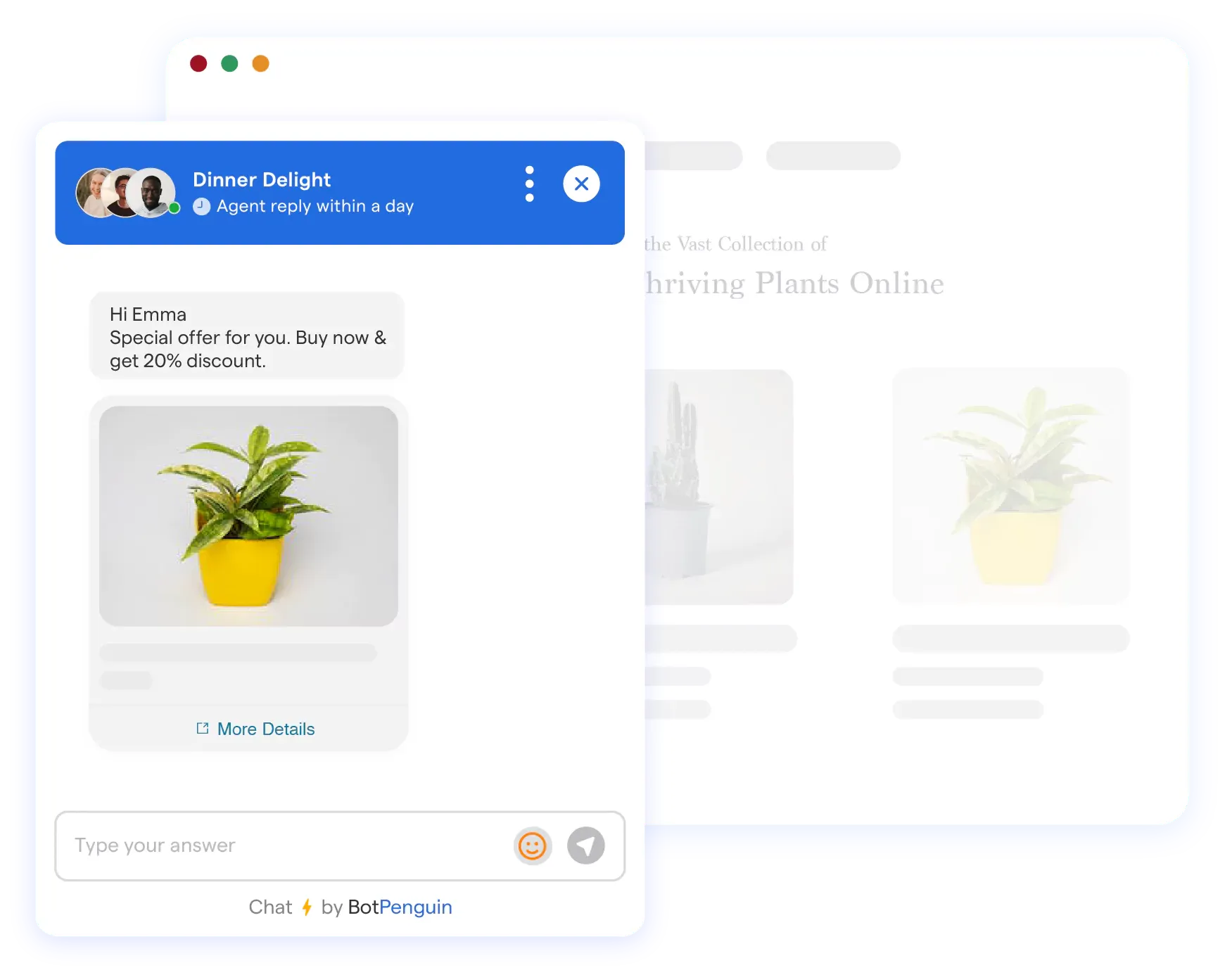
AI adjusts marketing messages in real-time based on user interactions. For instance, a streaming service like Netflix uses AI to recommend movies and shows based on individual viewing habits, enhancing user satisfaction and increasing retention rates by offering highly relevant suggestions.
Generative AI examples based tools like Botpenguin can contextualise conversations and enage in human like conversations for marketing tasks.
Customer Insights and Behavior Analysis
Generative AI applications are helping businesses better understand their customers by providing deep insights into behavior, enabling smarter, data-driven decisions.
- Predictive Analytics: AI predicts future customer behaviors and trends, giving businesses a competitive edge. A fashion retailer used AI to forecast demand for new collections, enabling them to optimize inventory levels and reduce overstock or understock situations, thereby cutting costs and increasing sales.
- Customer Segmentation: AI models segment customers into distinct groups based on behaviors and preferences, allowing for more targeted marketing efforts.
A financial services firm utilized AI to analyze customer data and identify high-value clients, tailoring offers specifically for them, which increased conversion rates and customer satisfaction.
- Sentiment Analysis: AI helps businesses gauge public sentiment by analyzing social media and customer reviews. For example, a beauty brand used AI-powered sentiment analysis to track online reviews and adjust its marketing strategies accordingly, improving brand perception and customer loyalty.
Content Generation for Advertisements
Generative AI is enhancing the creativity and efficiency of content creation in advertising, reducing time and costs while maintaining high-quality results.
- Ad Copy Creation: AI generates engaging, on-brand ad copy tailored to specific target audiences. A digital marketing agency adopted AI tools to streamline ad copywriting for various clients, ensuring consistency and saving time during content creation.
- Visual Content Design: AI assists in designing visually appealing graphics, images, and videos for ads. An automotive company used AI to produce attention-grabbing promotional videos showcasing the features of their latest car model, increasing interest and driving sales.
- Multilingual Content: AI makes it easier to reach global audiences by translating and adapting ad content for different language models and cultures.
A global brand leveraged AI to create localized advertisements in multiple language models, boosting its international reach and increasing sales in diverse markets.
Conclusion
In conclusion, generative AI is undoubtedly reshaping the marketing and advertising landscape, unlocking new levels of personalization, efficiency, and creativity.
By leveraging the power of AI, businesses can craft highly targeted campaigns, gain valuable customer insights, and produce engaging content faster than ever before.
The ability to predict customer behavior, segment audiences effectively, and personalize messages in real time enables brands to build deeper connections with their customers, ultimately driving better results.
As AI continues to evolve, the possibilities for its application in marketing are endless, and businesses that adopt these innovations will have a competitive edge.
Whether it's optimizing ad campaigns, generating compelling content, or gaining insights into customer preferences, generative AI is revolutionizing the way marketing is done.
For businesses looking to harness the power of AI in their marketing efforts, BotPenguin offers a robust AI-powered chatbot platform that can streamline customer engagement and improve conversion rates with ease.
Frequently Asked Questions (FAQs)
How is Generative AI used in healthcare?
Generative AI applications in healthcare play a crucial role in accelerating drug discovery, personalizing patient treatment plans, and enhancing medical imaging diagnostics.
These capabilities enable faster, more accurate healthcare solutions and better patient outcomes by tailoring treatments to individual needs and improving diagnostic precision.
What are the benefits of Generative AI in finance?
Generative AI models in finance significantly improve fraud detection, algorithmic trading, and risk management.
By analyzing large datasets and identifying patterns, generative AI helps financial institutions optimize trading strategies, detect fraudulent activities in real time, and better manage financial risks, ultimately leading to enhanced efficiency, security, and reduced operational costs.
How does Generative AI improve marketing and advertising?
Generative AI in marketing and advertising provides powerful tools for personalizing campaigns, analyzing customer behavior, and creating engaging content.
With AI-driven insights, businesses can optimize targeted ads, improve customer segmentation, and increase conversion rates, delivering a more customized experience that drives higher engagement.
What are some examples of Generative AI in entertainment?
Generative AI in entertainment has revolutionized content creation by generating music, art, and writing, designing intricate game environments, and powering immersive virtual reality experiences.
For instance, AI-generated music compositions have changed the way playlists are curated, and AI-driven game design is improving player experiences by creating more dynamic and engaging virtual worlds.
How does Generative AI optimize manufacturing processes?
Generative AI applications in manufacturing improve product design, enable predictive maintenance, and optimize supply chain management.
AI-driven solutions help in designing better products, anticipating equipment failures before they occur, and improving logistics efficiency, all of which contribute to greater productivity, cost savings, and minimized downtime.



